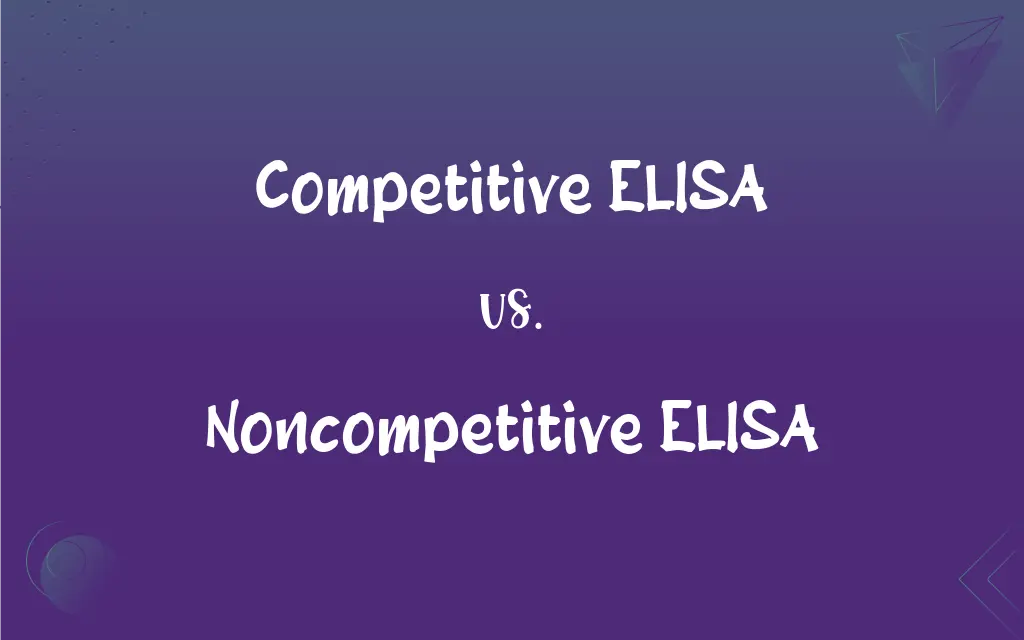Competitive ELISA vs. Noncompetitive ELISA: What's the Difference?
Edited by Aimie Carlson || By Harlon Moss || Published on September 27, 2024
Competitive ELISA refers t antigen competes with a reference for binding, decreasing signal with more target. Noncompetitive ELISA refers to direct or indirect detection, signal increases with more target antigen.

Key Differences
Competitive ELISA works on the principle where the sample antigen competes with a reference antigen for binding to a specific antibody. The more the sample antigen, the less the reference antigen is bound, leading to a lower signal. In contrast, noncompetitive ELISA directly or indirectly measures the antigen without any competition, producing a signal proportional to the amount of antigen.
Competitive ELISA is highly sensitive and is particularly useful when the antigen is small and has only one epitope. It can effectively measure low concentrations of antigens. Noncompetitive ELISA, while also sensitive, is more straightforward and can be used for larger antigens with multiple epitopes.
Competitive ELISA can be more complex and time-consuming as it requires careful control of the reference antigen and antibody. Noncompetitive ELISA is generally simpler and faster, with fewer steps, as it directly involves the antigen-antibody reaction without competition.
In competitive ELISA, a lower signal indicates a higher concentration of the target antigen, which can be counterintuitive. In noncompetitive ELISA, the signal directly correlates with the antigen concentration, making interpretation more straightforward.
Competitive ELISA is preferred for small molecules, haptens, or when the antibody has only one binding site available. Noncompetitive ELISA is widely used for a variety of applications including diagnostics, vaccine development, and research, where larger proteins or molecules are involved.
ADVERTISEMENT
Comparison Chart
Principle
Competition between sample and reference antigen
Direct or indirect antigen detection
Sensitivity
High, especially for small antigens
High, suitable for larger antigens
Complexity
More complex procedure
Simpler and faster
Signal Interpretation
Inversely proportional to antigen concentration
Proportional to antigen concentration
Typical Applications
Small molecules, haptens
Larger proteins, various applications
ADVERTISEMENT
Competitive ELISA and Noncompetitive ELISA Definitions
Competitive ELISA
Sensitive Detection.
Due to its sensitivity, competitive ELISA is crucial in hormone level measurements.
Noncompetitive ELISA
Simplicity in Procedure.
Researchers prefer noncompetitive ELISA for its straightforward methodology.
Competitive ELISA
Complex Procedure.
While offering high sensitivity, competitive ELISA involves a complex setup.
Noncompetitive ELISA
Multiple Epitope Detection.
Noncompetitive ELISA effectively detects antigens with multiple binding sites.
Competitive ELISA
Reference Antigen Dependent.
Competitive ELISA requires careful calibration with a reference antigen.
Noncompetitive ELISA
Proportional Signal.
In noncompetitive ELISA, the signal intensity directly correlates with the antigen level.
Competitive ELISA
Antigen Competition.
Competitive ELISA quantifies small antigens by their competition with known quantities.
Noncompetitive ELISA
Versatile Applications.
Noncompetitive ELISA is versatile, used in diagnostics to vaccine research.
Competitive ELISA
Inverse Signal.
In competitive ELISA, a lower signal often indicates a higher target concentration.
Noncompetitive ELISA
Direct Measurement.
Noncompetitive ELISA directly measures antigen concentration through antibody binding.
FAQs
Why use competitive ELISA?
Ideal for small antigens and highly sensitive assays.
What does competitive ELISA measure?
Measures antigen concentration by competition with a known reference.
How do I interpret competitive ELISA results?
Lower signal indicates higher antigen concentration.
How does noncompetitive ELISA work?
Detects antigens directly or indirectly without competition.
Can competitive ELISA detect large proteins?
Less ideal for large proteins, best for small molecules.
What makes noncompetitive ELISA straightforward?
Direct correlation between signal and antigen concentration.
Is noncompetitive ELISA suitable for small molecules?
Yes, but competitive ELISA might provide better sensitivity.
What's the signal interpretation for noncompetitive ELISA?
Higher signal directly indicates more antigen.
Which ELISA is faster to perform?
Generally, noncompetitive ELISA is faster.
Is noncompetitive ELISA good for vaccine development?
Yes, it's widely used in vaccine and therapeutic development.
Can competitive ELISA detect multiple antigens?
It's more challenging due to the competition aspect.
How do you avoid errors in noncompetitive ELISA?
Ensure proper antibody-antigen binding and avoid cross-reactivity.
Can competitive ELISA results be quantitative?
Yes, with proper calibration and reference standards.
Can I automate both types of ELISA?
Yes, both can be automated for high-throughput screening.
How do I choose between the two ELISA types?
Consider the antigen size, required sensitivity, and complexity.
What are the typical errors in competitive ELISA?
Incorrect reference antigen or antibody concentrations.
How long does a competitive ELISA take?
Usually longer than noncompetitive due to extra steps.
Are both ELISAs used in clinical diagnostics?
Yes, depending on the specific requirements.
Is noncompetitive ELISA qualitative or quantitative?
It can be both, depending on the setup.
What's the cost difference between the two?
Competitive ELISA might be more costly due to additional reagents.
About Author
Written by
Harlon MossHarlon is a seasoned quality moderator and accomplished content writer for Difference Wiki. An alumnus of the prestigious University of California, he earned his degree in Computer Science. Leveraging his academic background, Harlon brings a meticulous and informed perspective to his work, ensuring content accuracy and excellence.
Edited by
Aimie CarlsonAimie Carlson, holding a master's degree in English literature, is a fervent English language enthusiast. She lends her writing talents to Difference Wiki, a prominent website that specializes in comparisons, offering readers insightful analyses that both captivate and inform.






































































